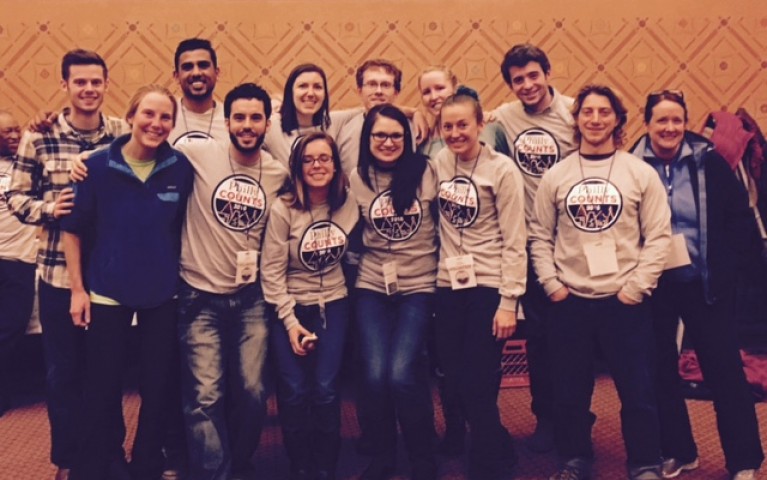Profound and Eye-Opening

"This was the same man I saw for a primary care visit that morning at the clinic; now I was sitting with him on the sidewalk, his bed for the night."
Caroline Komanecky is a student at Jefferson Medical College. She volunteered for the January 28 Point In Time Census of persons who are homeless on the streets. These are her reflections on her experience.
As I walked the dark and cold streets of Center City at 2 am, I saw a man laying outside of a WaWa, surrounded by vomit. I walked over to him with one of my PIT (Point in Time) Count teammates as he perked up and said “Hey, I remember you, Doctor Caroline!”
This was the same man I saw for a primary care visit that very morning and had the opportunity to chat for over an hour, thanks to a slow morning at the clinic. We had medically addressed his uncontrolled diabetes and chronic leg pain in the comfort of a warm exam room; now I was sitting with him on the sidewalk, his bed for the night, as he continued to vomit throughout our conversation because he had too much to drink. He did not want to come inside for the night. He just wanted to talk, which we did for the next 20 minutes.
My mind flashed back to that morning—of course his blood sugar was too high and his leg pain was not getting better, when this is how he spends the other 23 hours of his day outside of the doctor’s office. As a future physician, I strive to appreciate the social determinants of my patients’ health in their medical care. For example, do they have access to fruits and vegetables, or can they afford their medication copay? However, it was not until I spent time with this gentleman on the night of the PIT count that I was truly able to meet him where he was at, and genuinely understand the magnitude of the psychosocial stressors that are so impacting his health.
I was joined that night by several of my classmates, Jefferson medical and MPH students. We were spread throughout different parts of the city on different teams, but all thoughtfully reflected upon our shared humanity with the men and women we spoke to on the streets that night.
As fourth-year medical student, Sarah Wells, summarizes perfectly: "It is a profound and eye-opening experience to meet with people who are homeless on a cold January night and talk about the factors that are contributing – mental health conditions, addiction, veteran status. Walking the icy streets of Philadelphia under the light of the stars and streetlamps, and meeting those who are sleeping outside in the frigid weather is powerful. It provides valuable time to reflect on what we as a city and as individuals are doing for our fellow people experiencing homelessness, and how we can do more to help.”